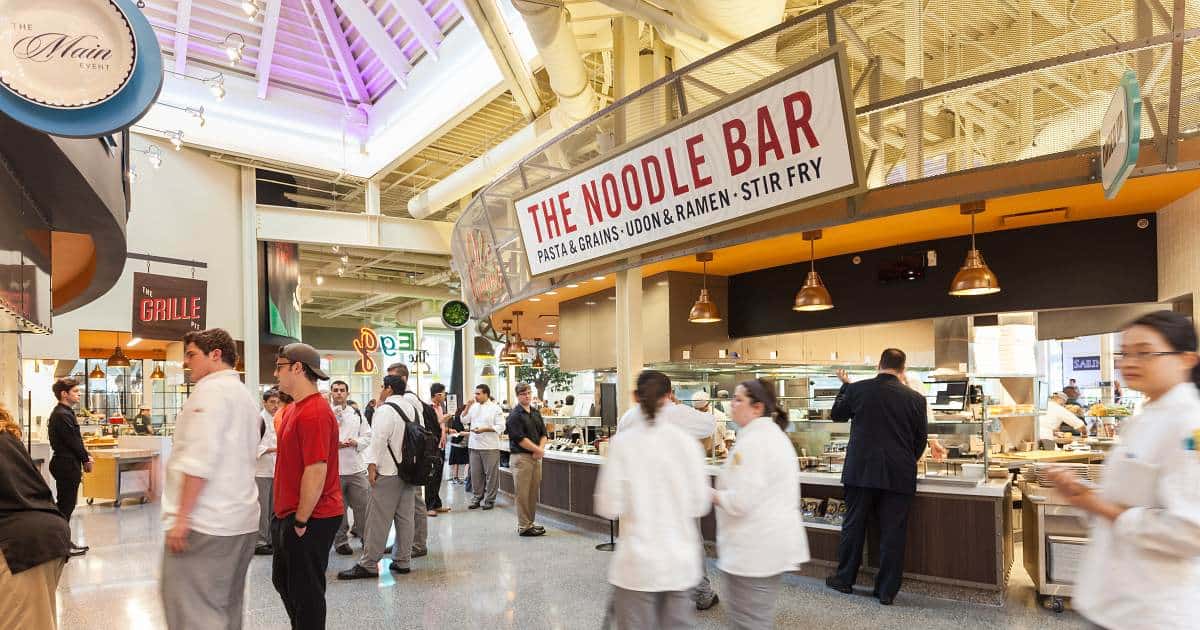
Amid all the ingredients tasted throughout the CIA curriculum, there is now an oasis for students with food allergies. Developed by the CIA’s Allergen Awareness Committee and foodservice provider Restaurant Associates, the new OASIS program provides meals and snack options for students who are sensitive to any of the eight most common allergens.
A kitchen on campus has been specially designated to prepare the foods in an environment clear of any of the eight major allergens outlined by the U.S. Food and Drug Administration—peanuts, tree nuts, fish, shellfish, eggs, milk, soy, and wheat—as well as gluten. The kitchen, housed in a building away from the other 42 teaching kitchens on the New York campus, is carefully monitored to avoid cross-contact or cross-contamination.
“OASIS offers a safe haven for students with allergies,” says Brendan Walsh, dean of the CIA’s School of Culinary Arts and chair of the Allergen Awareness Committee. “The program also naturally advances the CIA’s plant-forward message.”
As with other CIA dining options, OASIS menus promote the principles of the college’s Menus of Change initiative. Among these principles is creating dishes using whole grains, vegetables, and alternative proteins, and having meat play a supporting role on the plate, if used at all. Main courses are vegan, and students have the option of adding a small portion of grilled chicken, beef, or pork if they choose.
“At OASIS, the opportunity to provide innovative Menus of Change-driven offerings to the CIA community has been a rewarding experience,” says Michael Smith, executive chef for Restaurant Associates at the CIA. “We look forward to partnering with our student guests to redefine what it means to eat allergen-free and plant-forward.”
Chef Smith adds that the special kitchen also serves as an R&D lab for allergen-free recipe development for the CIA as well as for Restaurant Associates and its parent company, Compass Group.
After the meals are composed, they are sealed and transported to The Egg, the college’s student dining venue, where they can be purchased as “grab-and-go” items on CIA student meal plans.
Menus change every week. Some of the dishes offered so far include:
- Penne, Grilled Eggplant, Broccoli Rabe, Ratatouille, Tomatoes, Chiffonade Basil, Toasted Sunflower Seeds
- Curry Roasted Cauliflower, Marinated Cucumbers, Lentils, Peas, Roasted Chickpeas, Lemon-Mint Aioli
- Sesame Noodles, Nori Roasted Oyster Mushrooms, Long Beans, Fermented Cabbage, Chili Vinaigrette
- Rice Milk Smoothie
The program launched in early May, and it has quickly become popular—and not just with students who have food allergies or other special dietary restrictions. For instance, at the cost of just two points on the student meal plan, the vegetable crudité with dip has been selling well as a side dish or between-meal snack among CIA students who don’t have any dietary limitations. An added draw is that the offerings are minimally processed and made from single-source ingredients without hidden additives or seasonings.
OASIS is just one initiative developed by the Allergen Awareness Committee, which had the dual goal of providing food for students on restricted diets and promoting greater campus-wide awareness about various allergens and what protections are necessary. While students have always learned about food allergies in the CIA’s required Food Safety course, now they must also successfully complete the National Restaurant Association’s ServSafe Allergen curriculum to pass the class. In addition, menus from kitchen classes on campus include a list of potential allergens for each dish and there is an allergen awareness page on the CIA student portal.
“Allergen awareness and finding solutions to embrace the needs of those with food allergies are important skills for our students to know as they go on to be food business leaders after graduating from the CIA,” Chef Walsh says.
One critical caveat that students need to be aware of is that absolute non-contact of allergens cannot be guaranteed and students with food allergies or other dietary restrictions need to continue to serve as their own self-advocates.
